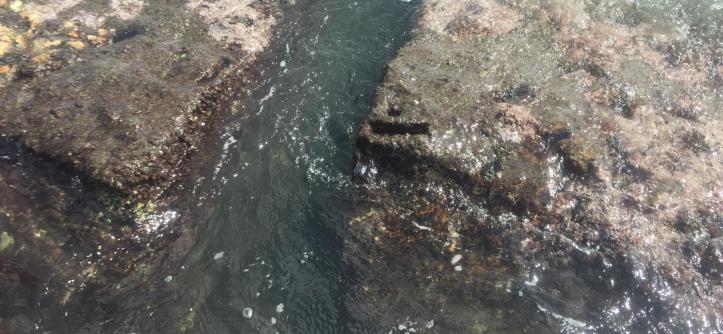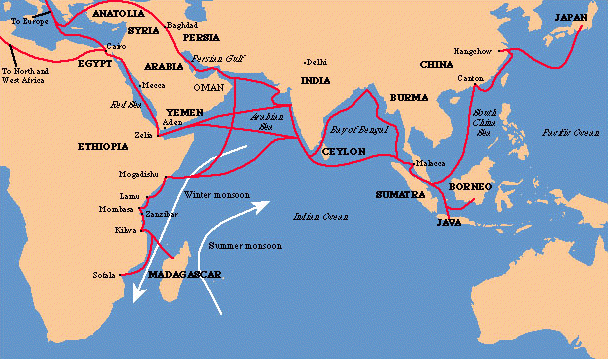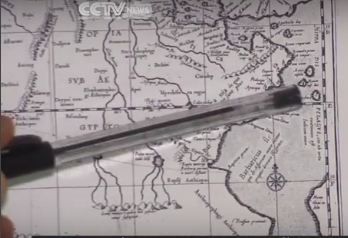It looks like you're using an Ad Blocker.
Please white-list or disable AboveTopSecret.com in your ad-blocking tool.
Thank you.
Some features of ATS will be disabled while you continue to use an ad-blocker.
share:
Thanks to extremely low tides, a diver spotted a 4-kilometer wall which belonged to the 2,000-year-old ‘lost’ city. According to archaeologists, the discovery of the 2,000-year-old lost city could completely alter our understanding of history
fter an unusually low tide revealed what appeared to be the remnants of a 4-kilometer-long wall, a diver discovered what could be one of the most important archaeological underwater discoveries in the last century. According to researchers, Allen Sutten a local scuba diver could have found the remains of Rhapta, an ancient city dating back some 2,000 years. Rhapta was a prominent marketplace said to have existed somewhere on the southeastern coast of the African Continent. It rose to prominence during the 1st century CE. Before the low tides revealed the giant wall off the coast of Africa, there were a couple of theories where the city was located. However never before has conclusive evidence been found proving that the ‘lost’ city had actually existed Based on the ancient Periplus of the Erythraean Sea, Rhapta was ‘the last marketplace of Azania’ located two days’ travel south from the Menouthias islands. However, Claudius Ptolemy, a prosperous merchant said Rhapta was located ‘where the river of the same name enters the Indian Ocean opposite the Island of Menouthias.’ The lost city of ‘Rhapta’ was documented in Ptolemy’s Geography as Africa’s first metropolis. According to Ptolemy, it was one of the wealthiest cities of its time and was considered among merchants as a trading hub for metal weapons and tortoiseshell.
www.ewao.com...
klik link for short vid.

Professor Prof. Felix Chami Had been on the hunt for Rhapta but tSutten beat him to it, it's time to dust off or rather book mark our Periplus of the Erythraean Sea, I think this may well be an out growth of what was known as Punt, a little further north and this would be the ancestor of the Swahili states of the middle ages, for some reason I was expecting the city to be on the mainland..hence looking up the Periplus is in order.
a reply to: Spider879
Great information. I feel so sad for the Africans (and other peoples also ) who have had their ancient history virtually destroyed. I suspect there is a lot more to find and hope they will be able to excavate without too much looting and spoiling of the site.
Great information. I feel so sad for the Africans (and other peoples also ) who have had their ancient history virtually destroyed. I suspect there is a lot more to find and hope they will be able to excavate without too much looting and spoiling of the site.
Ok found the vid on Youtube all that was buried and turned into reef, expect to find Axumite, Meroitic , Roman, Persian, Indian perhaps Chinese as off course various southern mainland artifacts.
edit on 8-6-2016 by Spider879 because: (no reason given)
well good on him, it's amazing how people can easily accept the ancient finds in some places but not in others, and will refute them profusely for
what they are.
I would like to think most coasts would of had some form of sonar/radar one throughout history. Clearly I was wrong with sort of assumption. I think
this may spur some explorers to infant do this on many "unexplored" coasts.
This actually makes perfect sense. For those who are willing to interpret the geologic evidence honestly, it's plain that sea levels used to be lower,
as in the case of this city. And going back about ten-twelve thousand years, they were hundreds of feet lower. And naturally, the largest and most
numerous settlements that existed at those times were located where there was easy access to food- on the shoreline, of course. While this info
doesn't support the current prevailing historical/scientific narratives, there's plenty of evidence to support it.
Perhaps most amazing of all, those changes in worldwide ocean level weren't caused by that Era of human civilization producing CO2, but by natural/astronomical causes!
Very interesting, always cool when another piece of the puzzle is found. Thanks for sharing!
Perhaps most amazing of all, those changes in worldwide ocean level weren't caused by that Era of human civilization producing CO2, but by natural/astronomical causes!
Very interesting, always cool when another piece of the puzzle is found. Thanks for sharing!
originally posted by: GemmyMcGemJew
I would like to think most coasts would of had some form of sonar/radar one throughout history. Clearly I was wrong with sort of assumption. I think this may spur some explorers to infant do this on many "unexplored" coasts.
Yeah but I don't know if sonar wouldn't have read it as just reefs, radar is for the skies btw, there is soo much hidden under sand, sea, snow and shrubs I don't think we have even scratched the surface.
M4nWithNoN4me I don't know how far complex societies go back but Göbekli Tepe proved you are not a lair..
This actually makes perfect sense. For those who are willing to interpret the geologic evidence honestly, it's plain that sea levels used to be lower, as in the case of this city. And going back about ten-twelve thousand years, they were hundreds of feet lower. And naturally, the largest and most numerous settlements that existed at those times were located where there was easy access to food- on the shoreline, of course. While this info doesn't support the current prevailing historical/scientific narratives, there's plenty of evidence to support it. Perhaps most amazing of all, those changes in worldwide ocean level weren't caused by that Era of human civilization producing CO2, but by natural/astronomical causes! Very interesting, always cool when another piece of the puzzle is found. Thanks for sharing!
a reply to: Spider879
This is a really cool story and I am eager to know more. Specifically a question that keeps running through my mind is...possibly naive on my part but I will ask anyway...
How does this find completely alter our understanding of history or how could it?
This is a really cool story and I am eager to know more. Specifically a question that keeps running through my mind is...possibly naive on my part but I will ask anyway...
How does this find completely alter our understanding of history or how could it?
originally posted by: MamaJ
a reply to: Spider879
This is a really cool story and I am eager to know more. Specifically a question that keeps running through my mind is...possibly naive on my part but I will ask anyway...
How does this find completely alter our understanding of history or how could it?
Look at it this way Rhapta is kinda like finding the legendary city of Atlantis it was mentioned by the Greco Romans as a rich and cosmopolitan city where traders from their known world sought out exotic goods, and if the network was the same as it were for the middle age Swahili states then yeah it's a big deal.

This is what the medieval trade network looked like you would have Cinnamon coming from as far away as Malaysia, spices from India, gold and Ivory from mainland Africa Roman ships would have docked there for instance, then you'd have biological and cultural exchanges at an even earlier date than previously expected this far south.
edit on 8-6-2016 by Spider879 because: (no reason given)
originally posted by: PLAYERONE01
well good on him, it's amazing how people can easily accept the ancient finds in some places but not in others, and will refute them profusely for what they are.
I've never seen any refutation for the existence of Rhapta.
After all, it's existence was documented in literature, just not with physical evidence.
Arguments over exact location (and remember, the site has not been positively identified) are not refutation of the "lost city."
Harte
originally posted by: M4nWithNoN4me
This actually makes perfect sense. For those who are willing to interpret the geologic evidence honestly, it's plain that sea levels used to be lower, as in the case of this city. And going back about ten-twelve thousand years, they were hundreds of feet lower. And naturally, the largest and most numerous settlements that existed at those times were located where there was easy access to food- on the shoreline, of course. While this info doesn't support the current prevailing historical/scientific narratives, there's plenty of evidence to support it.
Jericho is that old. Remind me again of why it's not submerged?
Look, just because a site is underwater, that is not an indication that it dates to before the ice melted.
Yes, sea levels rise.
But ground sinks too.
Look at Alexandria. Half of it lies on the bottom of the Med. and it dates to Alexander the Great.
Dwarka sank during the Medieval period.
There are hundreds of other examples.
Harte
originally posted by: AugustusMasonicus
a reply to: Spider879
Excellent post.
I read the article but it does not give the location of the ruins. Where are they?
Fittingly near a pricey resort at a place called Thanda Island
The Atlantis of Africa May Be Hiding Near a New Private Island Retreat
www.bloomberg.com...
a reply to: AugustusMasonicus
They already said, Africa!
...or if you meant specifically, this is what was indicated:

Seems to be in the far south. Don't try to find it, it's my treasure.
They already said, Africa!
...or if you meant specifically, this is what was indicated:

Seems to be in the far south. Don't try to find it, it's my treasure.
Would be interesting to know what did them in, a Tsunami or steady rising sea level??
originally posted by: Harte
I've never seen any refutation for the existence of Rhapta.
After all, it's existence was documented in literature, just not with physical evidence.
Arguments over exact location (and remember, the site has not been positively identified) are not refutation of the "lost city."
Harte
And just to add, the locals (Ja Ja tribe or similar name) say that this find is remnants of the Portugese settlement. It is the archeologists who say it MAY be Rhapta - they are currently waiting for some finds to be dated before they can attempt to confirm anything. The archeologists believe the Portugese settlement may have been built over the original foundations (hence the wait for dating).
So, in summary, nothing confirmed yet. That said, it does seem to fit the Peripylus.
originally posted by: AugustusMasonicus
a reply to: Spider879
Much further down the coast than I expected. It would be interesting to know if the Greeks and Romans physically made it there along with some of the Indus valley natives as well.
Yes we first heard about the city from the Greeks especially the Ptolemies who said they had visited there.
The Voyage around the Erythraean Sea or the red sea.
depts.washington.edu...
You may want to book mark the above.
edit on 8-6-2016 by Spider879 because: (no reason given)
new topics
-
Weinstein's conviction overturned
Mainstream News: 52 minutes ago -
Supreme Court Oral Arguments 4.25.2024 - Are PRESIDENTS IMMUNE From Later Being Prosecuted.
Above Politics: 2 hours ago -
Krystalnacht on today's most elite Universities?
Social Issues and Civil Unrest: 2 hours ago -
Chris Christie Wishes Death Upon Trump and Ramaswamy
Politicians & People: 2 hours ago -
University of Texas Instantly Shuts Down Anti Israel Protests
Education and Media: 5 hours ago -
Any one suspicious of fever promotions events, major investor Goldman Sachs card only.
The Gray Area: 7 hours ago -
God's Righteousness is Greater than Our Wrath
Religion, Faith, And Theology: 11 hours ago
top topics
-
VP's Secret Service agent brawls with other agents at Andrews
Mainstream News: 16 hours ago, 11 flags -
Krystalnacht on today's most elite Universities?
Social Issues and Civil Unrest: 2 hours ago, 7 flags -
Nearly 70% Of Americans Want Talks To End War In Ukraine
Political Issues: 17 hours ago, 6 flags -
Sunak spinning the sickness figures
Other Current Events: 16 hours ago, 5 flags -
Supreme Court Oral Arguments 4.25.2024 - Are PRESIDENTS IMMUNE From Later Being Prosecuted.
Above Politics: 2 hours ago, 5 flags -
Weinstein's conviction overturned
Mainstream News: 52 minutes ago, 4 flags -
Electrical tricks for saving money
Education and Media: 14 hours ago, 4 flags -
University of Texas Instantly Shuts Down Anti Israel Protests
Education and Media: 5 hours ago, 2 flags -
Any one suspicious of fever promotions events, major investor Goldman Sachs card only.
The Gray Area: 7 hours ago, 2 flags -
Chris Christie Wishes Death Upon Trump and Ramaswamy
Politicians & People: 2 hours ago, 1 flags
active topics
-
Chris Christie Wishes Death Upon Trump and Ramaswamy
Politicians & People • 9 • : Hecate666 -
Nearly 70% Of Americans Want Talks To End War In Ukraine
Political Issues • 80 • : FlyersFan -
Supreme Court Oral Arguments 4.25.2024 - Are PRESIDENTS IMMUNE From Later Being Prosecuted.
Above Politics • 29 • : xuenchen -
University of Texas Instantly Shuts Down Anti Israel Protests
Education and Media • 103 • : DBCowboy -
VP's Secret Service agent brawls with other agents at Andrews
Mainstream News • 45 • : network dude -
Weinstein's conviction overturned
Mainstream News • 10 • : xuenchen -
Remember These Attacks When President Trump 2.0 Retribution-Justice Commences.
2024 Elections • 57 • : TzarChasm -
-@TH3WH17ERABB17- -Q- ---TIME TO SHOW THE WORLD--- -Part- --44--
Dissecting Disinformation • 670 • : cherokeetroy -
British TV Presenter Refuses To Use Guest's Preferred Pronouns
Education and Media • 159 • : 5thHead -
HORRIBLE !! Russian Soldier Drinking Own Urine To Survive In Battle
World War Three • 40 • : Myhandle
